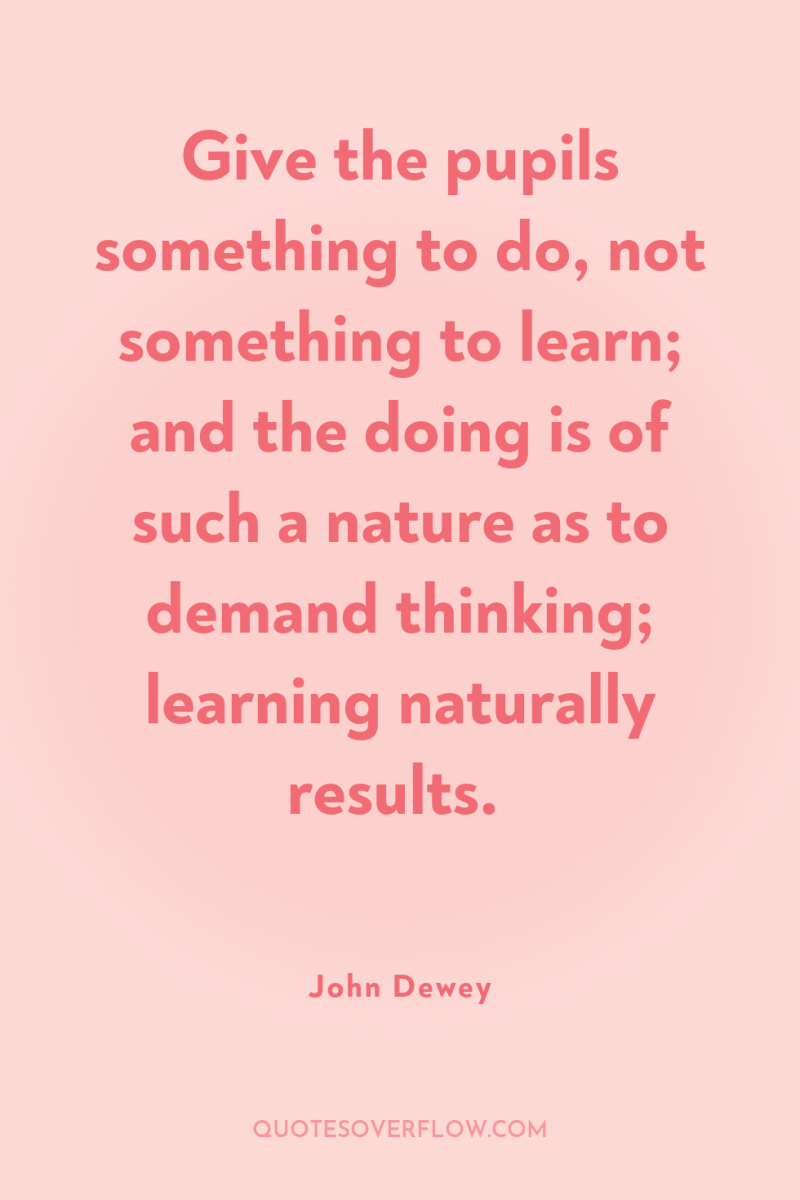
1
Give the pupils something to do, not something to learn; and the doing is of such a nature as to demand thinking; learning naturally results.John Dewey

2
The goal of education is to enable individuals to continue their education.John Dewey
3
There is no such thing as educational value in the abstract. The notion that some subjects and methods and that acquaintance with certain facts and truths possess educational value in and of themselves is the reason why traditional education reduced the material of education so largely to a diet of predigested materials.John Dewey
4
Faith in the possibilities of continued and rigorous inquiry does not limit access to truth to any channel or scheme of things. It does not first say that truth is universal and then add there is but one road to it.John Dewey
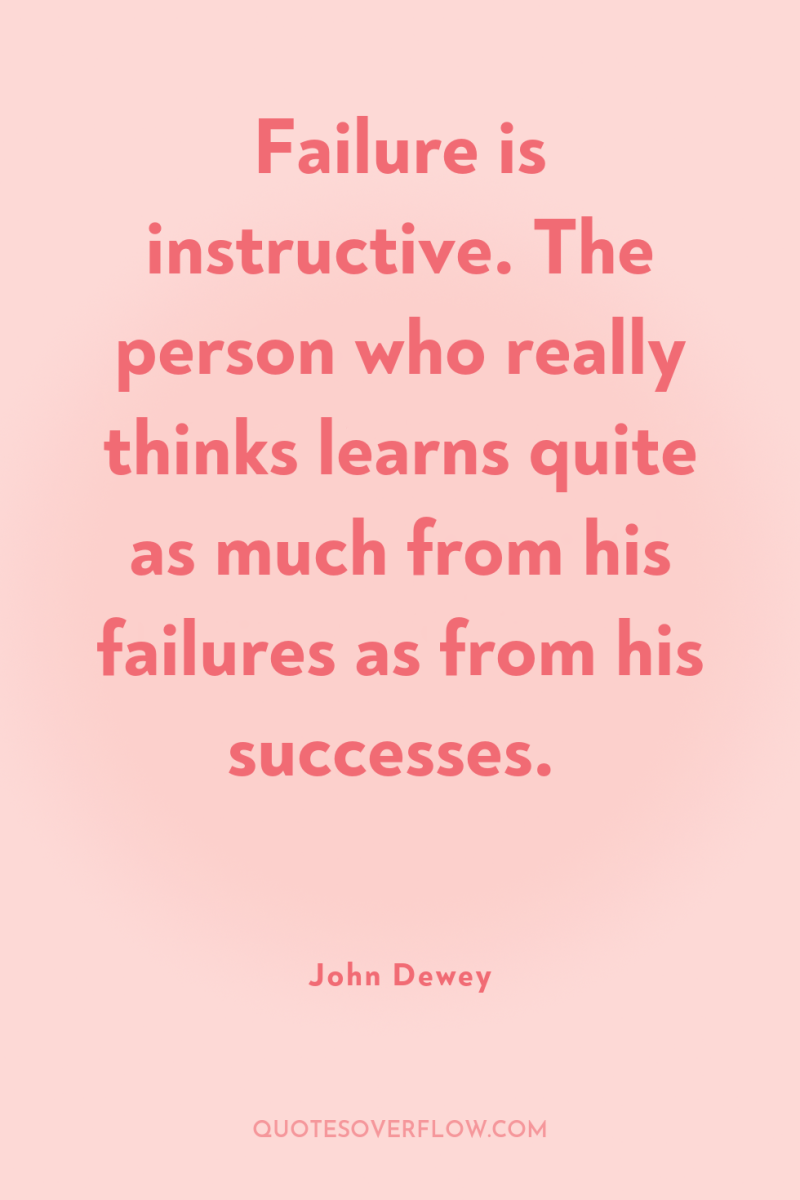
5
Failure is instructive. The person who really thinks learns quite as much from his failures as from his successes.John Dewey
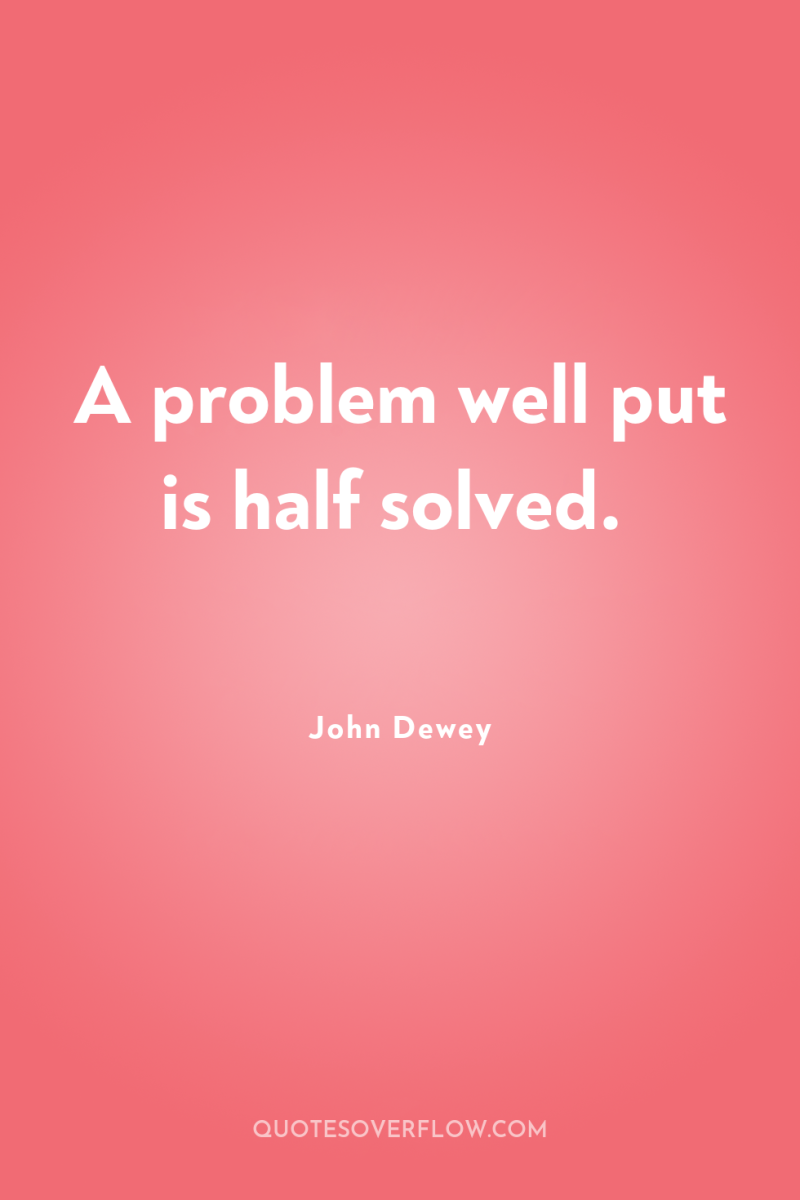
6
A problem well put is half solved.John Dewey

7
To find out what one is fitted to do, and to secure an opportunity to do it, is the key to happiness.John Dewey
8
For in spite of itself any movement that thinks and acts in terms of an ‘ism becomes so involved in reaction against other ‘isms that it is unwittingly controlled by them. For it then forms its principles by reaction against them instead of by a comprehensive, constructive survey of actual needs, problems, and possibilities.John Dewey
9
Were all instructors to realize that the quality of mental process, not the production of correct answers, is the measure of educative growth something hardly less than a revolution in teaching would be worked.John Dewey
10
As we have seen there is some kind of continuity in any case since every experience affects for better or worse the attitudes which help decide the quality of further experiences, by setting up certain preference and aversion, and making it easier or harder to act for this or that end.John Dewey
11
A genuine purpose always starts with an impulse. Obstruction of the immediate execution of an impulse converts it into a desire. Nevertheless neither impulse nor desire is itself a purpose. A purpose is an end-view. That is, it involves foresight of the consequences which will result from acting upon impulse.John Dewey
12
Traditional education tended to ignore the importance of personal impulse and desire as moving springs. But this is no reason why progressive education should identify impulse and desire with purpose and thereby pass lightly over the need for careful observation, for wide range of information, and for judgment is students are to share in the formation of the purposes which activate themJohn Dewey
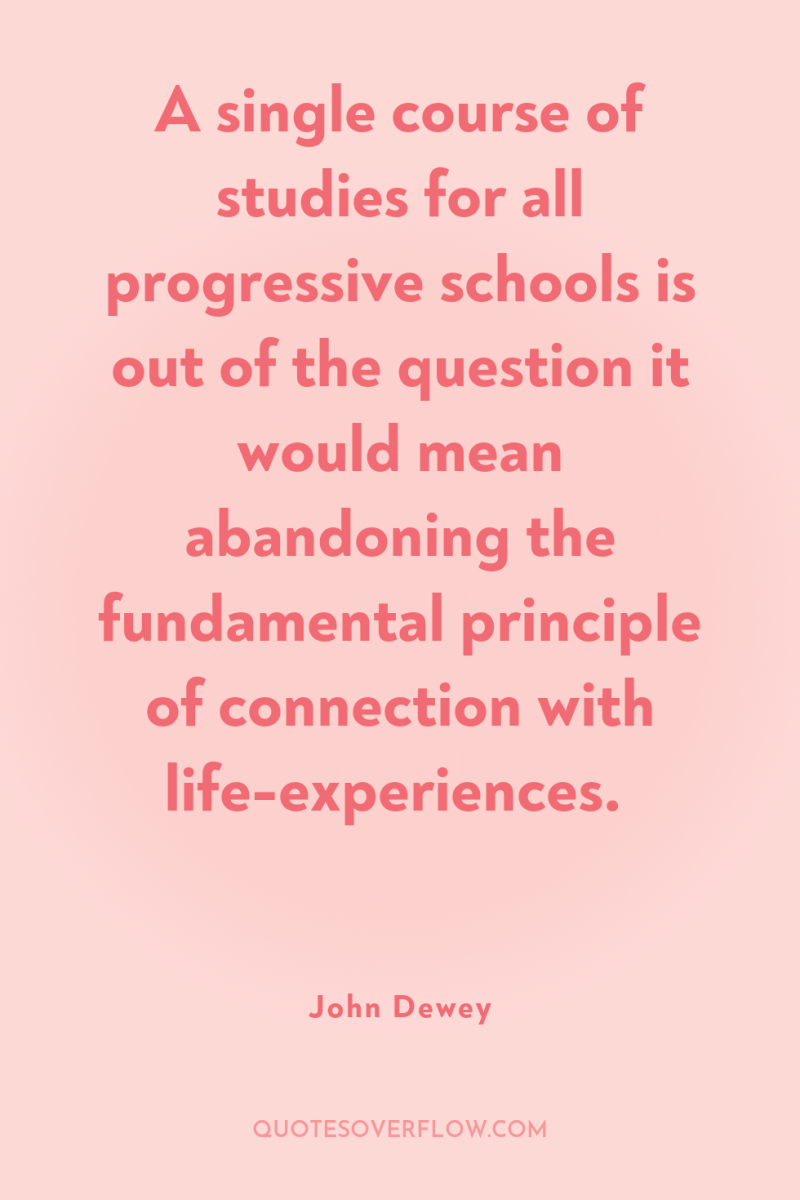
13
A single course of studies for all progressive schools is out of the question it would mean abandoning the fundamental principle of connection with life-experiences.John Dewey
14
Strait-jacket and chain-gang procedures had to be done away with if there was to a chance for growth of individuals in the intellectual springs of freedom without which there is no assurance of genuine and continued normal growth.John Dewey
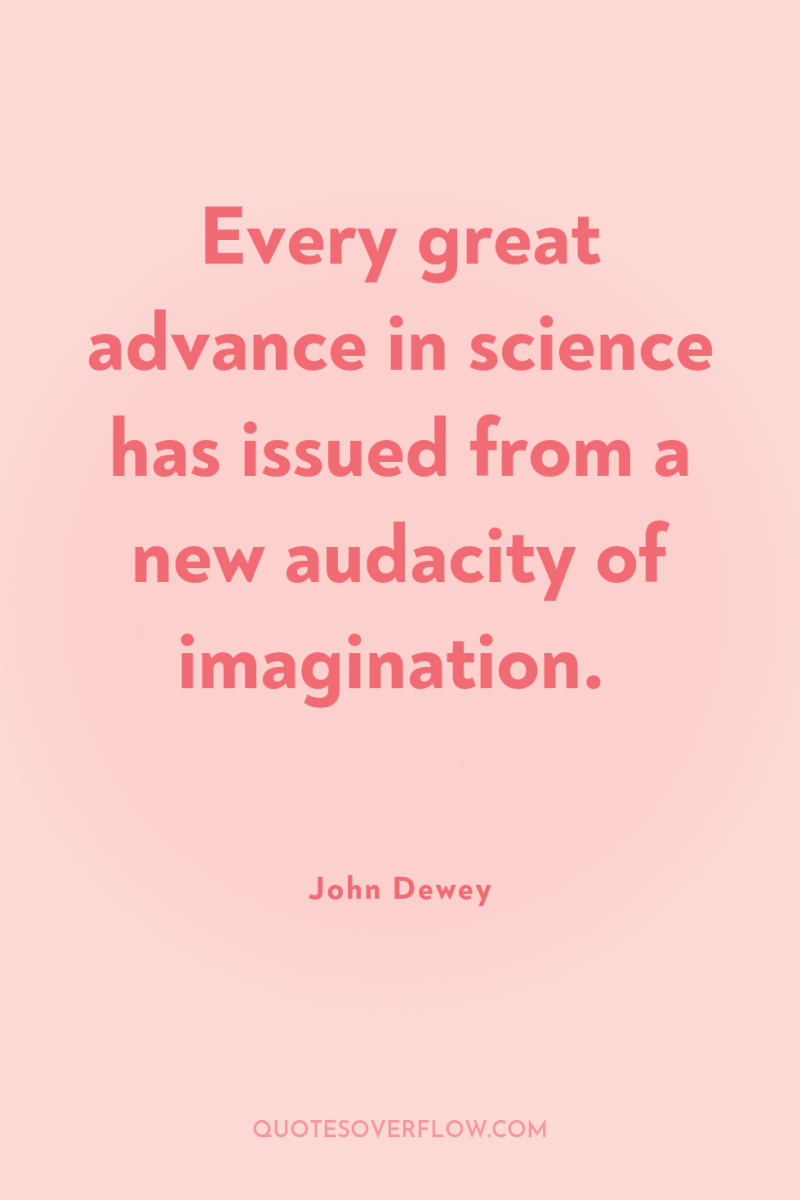
15
Every great advance in science has issued from a new audacity of imagination.John Dewey
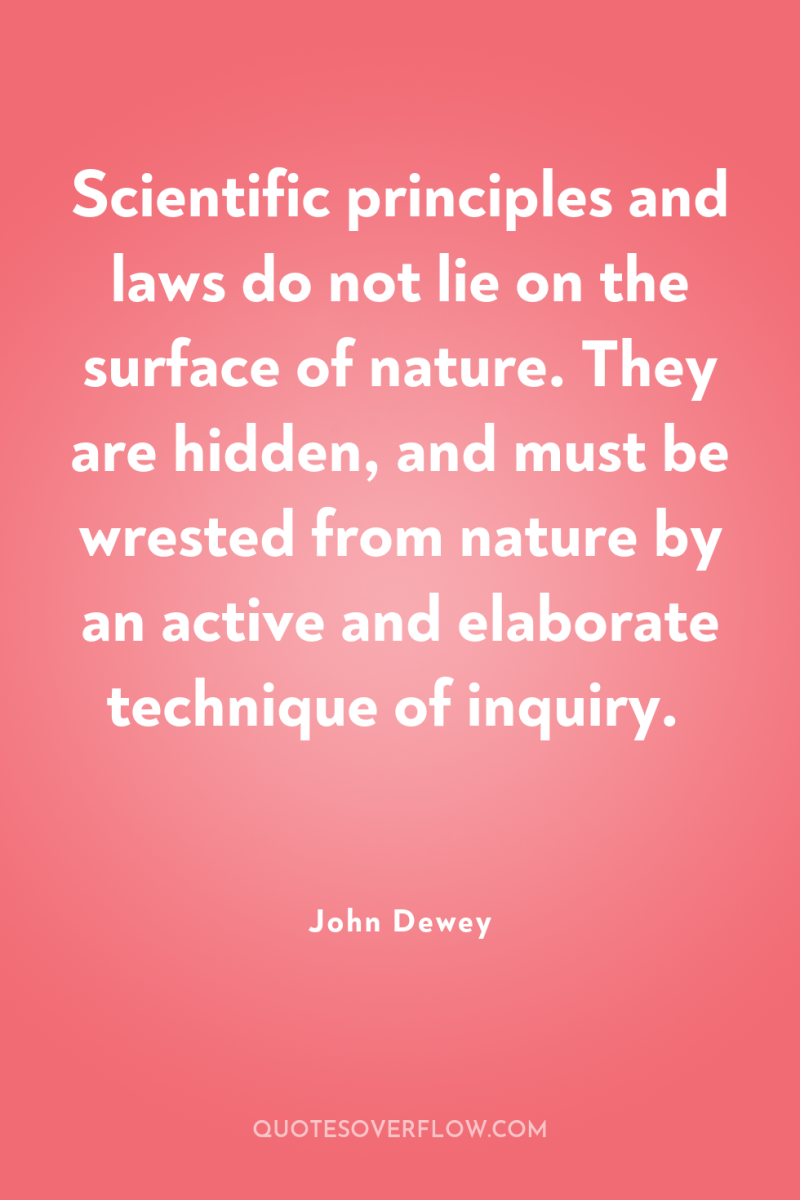
16
Scientific principles and laws do not lie on the surface of nature. They are hidden, and must be wrested from nature by an active and elaborate technique of inquiry.John Dewey
17
Democracy is a way of life controlled by a working faith in the possibilities of human nature. Belief in the Common Man is a familiar article in the democratic creed. That belief is without basis and significance save as it means faith in the potentialities of human nature as that nature is exhibited in every human being irrespective of race, color, sex, birth and family, of material or cultural wealth. This faith may be enacted in statutes, but it is only on paper unless it is put in force in the attitudes which human beings display to one another in all the incidents and relations of daily life. To denounce Nazism for intolerance, cruelty and stimulation of hatred amounts to fostering insincerity if, in our personal relations to other persons, if, in our daily walk and conversation, we are moved by racial, color or other class prejudice; indeed, by anything save a generous belief in their possibilities as human beings, a belief which brings with it the need for providing conditions which will enable these capacities to reach fulfillment. The democratic faith in human equality is belief that every human being, independent of the quantity or range of his personal endowment, has the right to equal opportunity with every other person for development of whatever gifts he has.John Dewey
18
Like the soil, mind is fertilized while it lies fallow, until a new burst of bloom ensues.John Dewey
19
Nothing is more tragic than failure to discover one’s true business in life, or to find that one has drifted or been forced by circumstance into an uncongenial calling.John Dewey
20
I feel the gods are pretty dead, though I suppose I ought to know that however, to be somewhat more philosophical in the matter, if atheism means simply not being a theist, then of course I'm an atheist.[ Letter to Max Otto]John Dewey
21
Every one has experienced how learning an appropriate name for what was dim and vague cleared up and crystallized the whole matter. Some meaning seems distinct almost within reach, but is elusive; it refuses to condense into definite form; the attaching of a word somehow (just how, it is almost impossible to say) puts limits around the meaning, draws it out from the void, makes it stand out as an entity on its own account.John Dewey
22
We rarely recognize the extent in which our conscious estimates of what is worth while and what is not, are due to standards of which we are not conscious at all. But in general it may be said that the things which we take for granted without inquiry or reflection are just the things which determine our conscious thinking and decide our conclusions.John Dewey
23
Collateral learning in the way of formation of enduring attitudes, of likes and dislikes, may be and often is much more important than the spelling lesson or lesson in geography or history that is learned.John Dewey
24
The most important attitude that can be formed is that of desire to go on learning.John Dewey
25
As long as politics is the shadow of big business, the attenuation of the shadow will not change the substance.John Dewey
26
When the organization called soul is free, moving and operative, initial as well as terminal, it is spirit. Qualities are both static, substantial, and transitive. Spirit quickens; it is not only alive, but spirit gives life. Animals are spirited, but man is a living spirit. He lives in his works and his works do follow him. Soul is form, spirit informs. It is the moving function of that of which soul is the substance. Perhaps the words soul and spirit are so heavily laden with traditional mythology and sophisticated doctrine that they must be surrendered; it may be impossible to recover for them in science and philosophy the realities designated in idiomatic speech. But the realities are there, by whatever names they be called.John Dewey
27
We do not learn from experience... we learn from reflecting on experience.John Dewey
28
Of all affairs, communication is the most wonderful.John Dewey
29
A problem well-defined is a problem half solved.John Dewey
30
Every art communicates because it expresses. It enables us to share vividly and deeply in meanings… For communication is not announcing things… Communication is the process of creating participation, of making common what had been isolated and singular… the conveyance of meaning gives body and definiteness to the experience of the one who utters as well as to that of those who listen.John Dewey
31
The two limits of every unit of thinking are a perplexed, troubled, or confused situation at the beginning, and a cleared up, unified, resolved situation at the close.John Dewey
32
While the living thing may easily be crushed by superior force, it none the less tries to turn the energies which act upon it into means of its own further existence. If it cannot do so, it does not just split into smaller pieces (at least in the higher forms of life), but loses its identity as a living thing. As long as it endures, it struggles to use surrounding energies in its own behalf. It uses light, air, moisture, and the material of soil. To say that it uses them is to say that it turns them into means of its own conservation. As long as it is growing, the energy it expends in thus turning the environment to account is more than compensated for by the return it gets: it grows.John Dewey
33
. have not some religions, including the most influential forms of Christianity, taught that the heart of man is totally corrupt? How could the course of religion in its entire sweep not be marked by practices that are shameful in their cruelty and lustfulness, and by beliefs that are degraded and intellectually incredible? What else than what we can find could be expected, in the case of people having little knowledge and no secure method of knowing; with primitive institutions, and with so little control of natural forces that they lived in a constant state of fear? .John Dewey
34
Life itself consists of phases in which the organism falls out of step with the march of surrounding things and then recovers unison with it–either through effort or by some happy chance. And, in a growing life, the recovery is never mere return to a prior state, for it is enriched by the state of disparity and resistance through which it has successfully passed. If the gap between organism and environment is too wide, the creature dies. If its activity is not enhanced by the temporary alienation, it merely subsists. Life grows when a temporary falling out is a transition to a more extensive balance of the energies of the organism with those of the conditions under which it lives.John Dewey
35
We only think when we are confronted with a problem.John Dewey
36
Arriving at one goal is the starting point to another.John Dewey
37
Confidence ... is directness and courage in meeting the facts of life.John Dewey
38
Since changes are going on anyway the great thing is to learn enough about them so that we will be able to lay hold of them and turn them in the direction of our desires. Condi-tions and events are neither to be fled from nor passively acquiesced in they are to be utilized and directed.John Dewey
39
To me faith means not worrying.John Dewey
40
To find out what one is fitted to do and to secure an opportunity to do it is the key to happiness.John Dewey
41
Every great advance in science has issued from a new audacity of imagination.John Dewey
42
To the being of fully alive the future is not ominous but a promise it surrounds the present like a halo.John Dewey
43
Nature is the mother and the habitat of man, even if sometimes a stepmother and an unfriendly home.John Dewey
44
Such happiness as life is capable of comes from the full participation of all our powers in the endeavor to wrest from each changing situations of experience its own full and unique meaning.John Dewey
45
Time and memory are true artists they remould reality nearer to the heart's desire.John Dewey
46
Man is not logical and his intellectual history is a record of mental reserves and compromises. He hangs on to what he can in his old beliefs even when he is compelled to surrender their logical basis.John Dewey
47
The belief that all genuine education comes about through experience does not mean that all experiences are genuinely or equally educative.John Dewey
48
To me faith means not worrying.John Dewey
49
Education is not preparation for life education is life itself.John Dewey
50
Education, therefore, is a process of living and not a preparation for future living.John Dewey